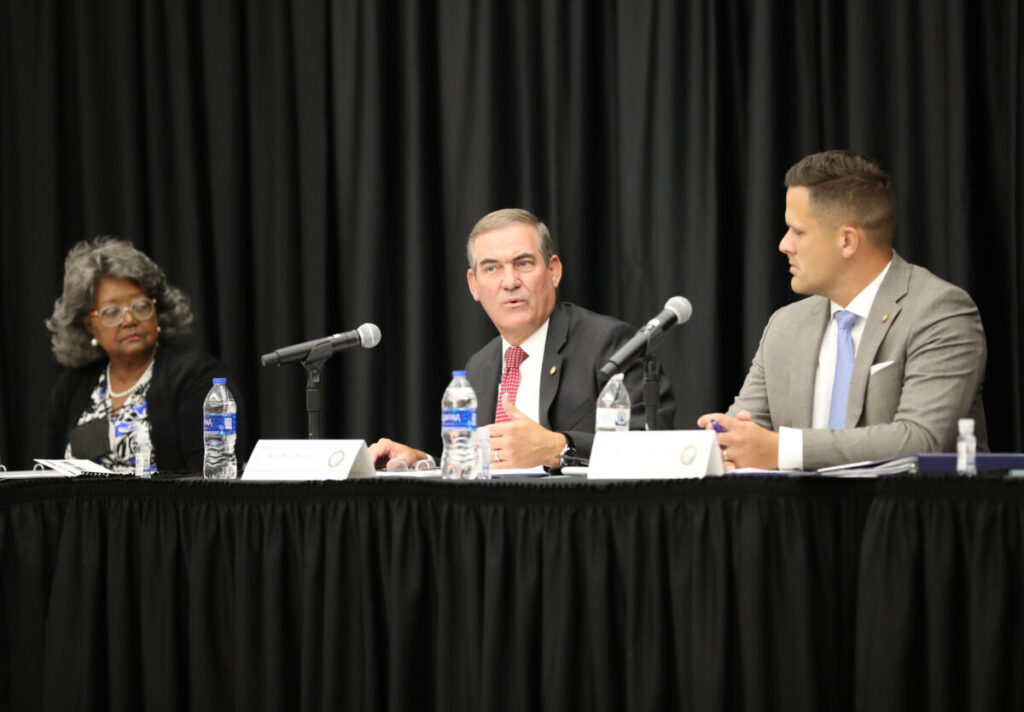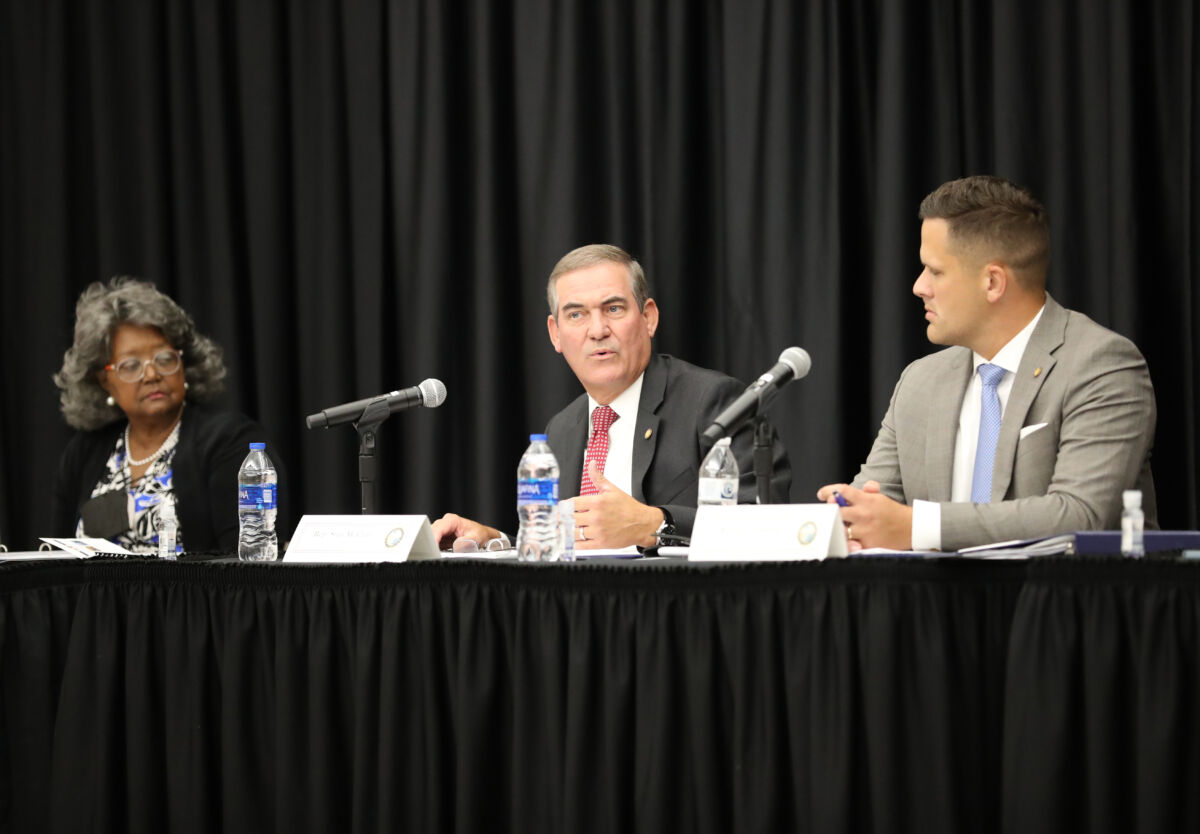A start to understanding this year’s local legislative priorities

Rep. Stan McLain, center, speaks as Rep. Yvonne Hayes Hinson, left, and Rep. Joe Harding, right, listen during the Marion County Delegation at the Klein Conference Center at the College of Central Florida in Ocala, Fla. on Thursday, Oct. 7, 2021. [Bruce Ackerman/Ocala Gazette] 2021.

Rep. Stan McLain, center, speaks as Rep. Yvonne Hayes Hinson, left, and Rep. Joe Harding, right, listen during the Marion County Delegation at the Klein Conference Center at the College of Central Florida in Ocala on Oct. 7, 2021. [Bruce Ackerman/Ocala Gazette]
The Marion County Legislative Delegation, along with other state congressional members, will soon leave their districts and head to Tallahassee as the regular session of the Florida legislature convenes at noon on Jan. 11, 2022. Not only does the 11th mark the beginning of the legislative session, but it is also the deadline for state congressional members to file bills for introduction as well.
The Marion County Legislative Delegation is made up of members of the Florida Legislature whose districts include portions of Marion County. In October, the delegation heard from a variety of sources including constituents, municipalities, advocacy organizations, and educational institutions as to which issues the groups considered priorities. The delegates then used the information to craft and prioritize their own agendas in advance of the January session.
What are on their bills and agendas, and how did they get there? How do legislative members deal with conflicting priorities in their districts? How do constituents get involved in the process?
This series is designed to highlight the priorities of legislators who represent all or parts of Marion County as the 2022 legislative session begins. It will allow constituents to understand what their elected leaders are focusing on, help them to hold their officials accountable when they do not deliver, and help when commendations are due when the elected leaders fulfill their promises.
In addition to the state legislators who will head to the capitol building in Tallahassee, locally, the Marion County Board of County Commissioners (MCBOCC) will begin their 2022 with a regular meeting on Jan. 4.
Marion County was one of the entities present at the October legislative delegation meeting, and commissioner Kathy Bryant presented the county’s legislative priorities, which include a state veteran’s home, a land conservation project, and drinking water issues as a result of PFAS contamination, amongst others.
More recently, Amanda Tart, the executive director for Administrative Services and the director of Human Resources for Marion County briefed the Marion County Board of County Commissioners on the county’s legislative priorities at the Dec. 21 MCBOCC meeting.
While non-governmental entities such as the College of Central Florida must rely on the legislative decisions of local and state governments for guidance, entities like Marion County and the municipalities within exist in a position where they too must rely on state and federal guidance, but also have a level of autonomy and agency to legislate on issues as well.
Tart detailed how this dynamic factors in to the approach the county takes to problem solving.
“The majority of the things that we do here, well, everything that we do, is either by local ordinance that tells us how to do something, a state statute that says, ‘This is how you’re going to do it,’ or a federal regulation. So, whenever we see these problems, we identify, ‘Hey, is this is this an issue for us because of a local ordinance? Yes. OK, great. Let’s go talk to the board and see what we can have done. If not, is it an issue at the state level?’ And so, the majority, or all of the ones that you’ll see as our legislative priorities, are issues that have to be addressed at the state level,” Tart pointed out.
She said all attempts are made to resolve any possible issues within the county first, and they only move on once nothing more can be done.
“Before we take anything and make it a legislative priority and ask our representatives to handle it at the state level, we’re going to research and try and identify anything that we can do at the local level that’s obviously not in opposition of a state statute or anything like that. But if there’s things that we can change at the local level, we’re going to do that first,” Tart said.
Tart also relayed that, although county staff is charged with executing the decisions made by commissioners, “The board sets the priorities. We staff work to assist the board in getting the information that they need.”
The county often works with local stakeholders to both create and assess priorities and how they can be addressed locally without having to involve state-level lawmakers. Tart described how this process plays out.
“So, as we go through, whether it’s CF [The College of Central Florida], the school board, any of the municipalities [within the county], the CEP [Ocala Metro Chamber and Economic Partnership], whoever, anybody who has their legislative priorities, we all look at each other and say, ‘Hey, how can we support one another? How can the CEP support us in getting this?’ And you know, we have a great community, and we work together very well. And we support each other. And that’s a good thing, because, you know, getting a letter from someone that says, ‘Hey, we support Marion County,‘ […] that certainly just strengthens our case,” Tart mentioned.
In the case of the new health science building CF has planned, action at the county level can have a positive impact at the state level. The college was able to locate two different community partners in both the Marion County Hospital District (MCHD) and the MCBOCC that agreed to provide matching funding–something that CF President Jim Henningsen noted at the time was attractive to state politicians.
Legislative priorities can often involve multiple stakeholders at different levels, and in some cases, the stakeholders might not see eye-to-eye on what a successful outcome looks like.
Tart said they are privileged to have local connections in the legislative delegation, and those connections help when it comes time to discuss priorities and setting an agenda.
“We have great legislators that represent throughout Marion County, and we have good relationships with them. Some of them were commissioners here at one point in time, and they’re very accessible. Their staff is very easy to work with. We go meet with them usually at their local offices and let them know this is the priority and this is why this is what we need it…I feel we’re very fortunate because even at the federal level, for the most part, we get good responses,” Tart explained.
While Marion County or its legislative delegation are both tasked with creating and prioritizing agenda items, both should be doing so with their constituents in mind. Tart described how county residents can get involved with the legislative process.
“They can always email their commissioners,” she said.
“They can reach out to staff, and we will relay those messages. Many of our commissioners go out, they do townhall meetings and things like that. So, they’re [Marion County residents] able to voice their concerns or ideas in those ways. And then, there are public comments [during MCBOCC meetings]. Those are probably the best ways to let commissioners know what they’d like to see change or what they’d like they’d like to see happen,” Tart pointed out.
Next, the series will detail the legislative priorities of state lawmakers whose districts include Marion County.





